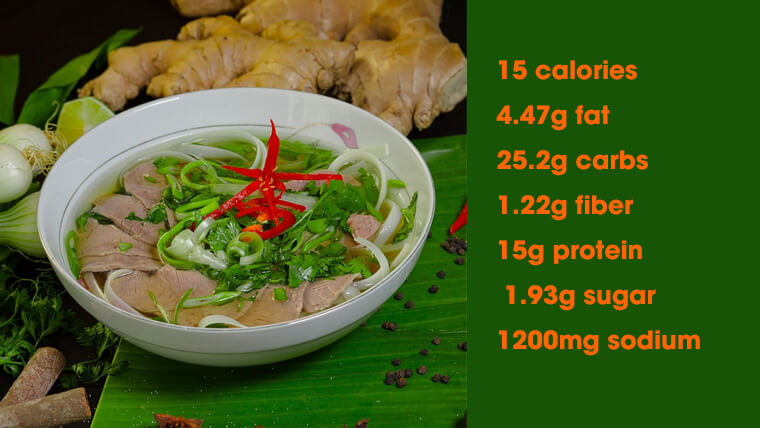Pho Nutrition Facts: Discover the Health Benefits of this Traditional Vietnamese Dish
Pho, a beloved Vietnamese dish, has gained popularity worldwide for its unique blend of flavors and wholesome ingredients. Not only is Pho a delightful culinary experience, but it also offers several health benefits. In this article, we will delve into the nutritional value of Pho, exploring its components and their positive impact on your well-being. Join us on this culinary journey as we unravel the secrets of pho nutrition facts and discover why this iconic dish is more than just a flavorful bowl of soup.
Pho is a traditional Vietnamese soup made with a delicate broth, rice noodles, and an assortment of toppings such as thinly sliced beef or chicken, fresh herbs, bean sprouts, lime, and chili. The complexity of flavors in Pho is derived from its aromatic spices and herbs, such as star anise, cinnamon, cloves, and coriander. This combination creates a symphony of tastes that make Pho a culinary delight.
Let's explore the nutritional content of a standard cup of homemade beef phở, based on the USDA Nutrient Database:
▪️ Calories: 215
▪️ Fat: 5.47 grams
▪️ Carbohydrates: 25.2 grams
▪️ Fiber: 1.22 grams
▪️ Protein: 15 grams
▪️ Sugar: 1.93 grams
▪️ Sodium: 1200 milligrams

Pho Nutrition Facts
Now, let's dive into the nutritional breakdown of a typical bowl of Pho:
a) Calories and Macronutrients
A serving of Pho, which includes the broth, noodles, and toppings, contains approximately 350-450 calories. The calorie content can vary depending on the portion size and ingredients used. Pho is also a balanced meal that provides a good mix of macronutrients. It is low in fat and cholesterol while being a significant source of carbohydrates and protein.
b) Carbohydrates
Pho is primarily made with rice noodles, which are a rich source of complex carbohydrates. These carbs provide sustained energy, making Pho an excellent choice for a fulfilling meal. However, it is worth noting that the carbohydrate content may vary depending on the portion size and whether additional condiments like hoisin sauce or sriracha are added.
c) Protein
Pho contains a notable amount of protein, thanks to the inclusion of lean meat, typically beef or chicken. Protein is essential for muscle repair and growth, and a bowl of Pho can contribute significantly to your daily protein intake. Additionally, if you opt for a vegetarian version, tofu can be substituted for meat to maintain the protein content.
d) Fiber
Pho is often accompanied by fresh herbs and bean sprouts, which provide a good amount of dietary fiber. Fiber aids in digestion, promotes a healthy gut, and helps regulate blood sugar levels. Including the herbs and bean sprouts in your Pho enhances its nutritional value and adds a satisfying crunch to every bite.
e) Micronutrients
Pho is a treasure trove of micronutrients due to its diverse array of ingredients. The herbs, such as Thai basil and cilantro, add a vibrant touch to the dish while providing essential vitamins and minerals. Additionally, the broth's spices, such as star anise and cinnamon, offer antioxidants and have anti-inflammatory properties.
Health Benefits of Pho
a) Hydration:
Pho is primarily a soup-based dish, making it an excellent choice for hydration. The warm broth combined with the liquids from the fresh ingredients helps replenish fluids in your body, making Pho a perfect option for rehydration after a workout or during illness.
b) Immune-Boosting Properties:
The aromatic spices used in Pho, such as star anise and cinnamon, possess natural antibacterial and antiviral properties. These spices, along with the fresh herbs, help strengthen the immune system and protect against common ailments.
c) Weight Management:
Pho, when consumed as part of a balanced diet, can aid in weight management. The combination of high-fiber noodles, protein-rich meat or tofu, and the broth's low
-calorie content keeps you satiated for longer, reducing the chances of overeating or snacking between meals.
d) Bone Health:
The broth used in Pho is often prepared by simmering beef or chicken bones, which releases valuable minerals like calcium, magnesium, and phosphorus. These minerals contribute to healthy bones and teeth, making phở an excellent choice for individuals concerned about their bone health.
Pho is not only a culinary masterpiece but also a dish with several health benefits. Its nutritional composition, including a good balance of macronutrients and the abundance of vitamins and minerals, makes Pho a wholesome meal choice. Whether you're seeking a warm bowl of comfort or a nutrient-packed dish, phở is sure to satisfy your taste buds and nourish your body. So, the next time you savor a bowl of Pho, relish in its flavors and appreciate the goodness it brings to your health.